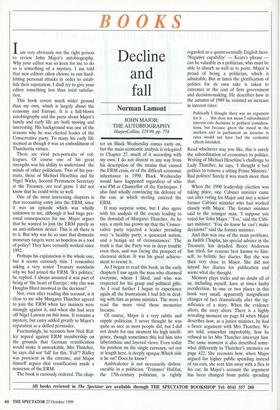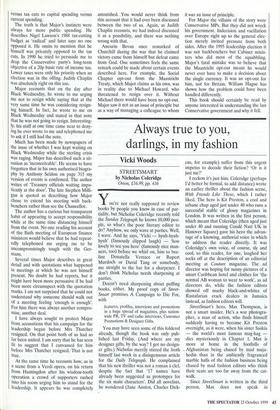BOOKS
Decline and fall
Norman Lamont
JOHN MAJOR: THE AUTOBIOGRAPHY HarperCollins, £19.99, pp. 774
Iam very obviously not the right person to review John Major's autobiography. Why your editor was so keen for me to do so is something of a mystery. I am told that new editors often choose to run hard- hitting personal attacks in order to estab- lish their reputation. I shall try to give your editor something less than total satisfac- tion.
This book covers much wider ground than my own, which is largely about the economy and Europe. It is a full-blown autobiography and the parts about Major's family and early life are both moving and interesting. His background was one of the reasons why he was elected leader of the Conservative party. To many his early life seemed as though it was an embodiment of Thatcherite virtues.
There are vivid pen-portraits of col- leagues. Of course one of his great strengths was his ability to understand the minds of other politicians. Two of his por- traits, those of Michael Heseltine and Sir Nigel Wicks, Second Permanent Secretary at the Treasury, are real gems. I did not know that he could write so well.
One of the most interesting chapters is that recounting entry into the ERM, since it was an episode which was wholly unknown to me, although it had huge per- sonal consequences for me. Major argues that he wanted to join the ERM purely as an anti-inflation device. This is all there is to it. But why was he so sure that domestic monetary targets were so hopeless as a tool of policy? They have certainly worked since 1992.
Perhaps his explanation is the whole one, but it seems curiously thin. I remember asking a very senior Treasury mandarin why we had joined the ERM. 'It's politics,' he replied. I always assumed it was part of being at 'the heart of Europe; why else was Douglas Hurd involved in the decision?
Nor, even after reading this account, is it clear to me why Margaret Thatcher agreed to join the ERM when her instincts were strongly against it, and when she had seen off Nigel Lawson on this issue. It remains a mystery, but entry added greatly to Major's reputation as a skilled persuader.
Fascinatingly, he recounts how Nick Rid- ley argued against ERM membership on the grounds that German reunification would make it unworkable. Mrs Thatcher, he says, did not 'fall' for this. 'Fall'? Ridley was prescient in the extreme, and Major himself argues that reunification made a nonsense of the ERM.
The book is curiously ordered. The chap- ter on Black Wednesday comes early on, but the main economic analysis is relegated to Chapter 27, much of it according with my own. I do not dissent in any way from his description of the strains that caused the ERM crisis, or of the difficult economic inheritance in 1990. Black Wednesday would have happened regardless of who was PM or Chancellor of the Exchequer. I also find wholly convincing his defence of the rate at which sterling entered the ERM.
It may surprise some, but I also agree with his analysis of the events leading to the downfall of Margaret Thatcher. As he says, a myth has grown up that the Conser- vative party rejected a leader presiding over 'a healthy party, a quiescent nation, and a benign set of circumstances'. The truth is that the Party was in deep trouble even then, and was facing the prospect of electoral defeat. It was his great achieve- ment to rescue it.
As I began to read this book, in the early chapters I saw again the man who charmed everyone, whom I liked, and who was respected for his grasp and political gifts. As I read further I began to experience again all the frustrations I had felt in deal- ing with him as prime minister. The more I read the more vivid those memories became.
Of course, Major is a very subtle and supple politician. I never thought he was quite as nice as most people did, but I did not doubt for one moment his high intelli- gence, though sometimes this led him into labyrinthine and layered views. Even today his position on the single currency, set out at length here, is deeply opaque.Which side is he on? Does he know?
Ambivalence is not necessarily dishon- ourable in a politician. 'Trimmer' Halifax, the 17th-century politician, is rightly regarded as a quintessentially English hero. `Negative capability' — Keats's phrase can be valuable in a politician, who must be able to absorb as well as to point. Major is proud of being a politician, which is admirable. But at times the glorification of politics for its own sake is taken to extremes at the cost of firm government and decision-making. He describes how in the autumn of 1989 he resisted an increase in interest rates:
Politically I thought there was no argument for it ... this does not mean I subordinated interest rate decisions to political considera- tions, but because given the mood in the markets and in parliament an increase in rates would not have had the economic effects intended.
Read whichever way you like, this is surely the subordination of economics to politics. Writing of Michael Heseltine's challenge to Lady Thatcher, he says, 'I thought it bad politics to remove a sitting Prime Minister.' Bad politics! Surely it was much more than that.
When the 1990 leadership election was taking place, one Cabinet minister came out after voting for Major and met a senior former Cabinet minister who had worked closely with Major. The former minister said to the younger man, 'I suppose you voted for John Major.' Yes,' said the Cabi- net minister. 'You do know he can't make decisions?' said the former minister.
And that was one of the main problems, as Judith Chaplin, his special adviser in the Treasury, has detailed. Bruce Anderson has tried, for reasons best known to him- self, to belittle her diaries. But she was then very close to Major. She did not intend her diaries for publication and wrote what she thought.
Memory plays tricks and no doubt all of us, including myself, have at times faulty recollection. In one or two places in this book very small, apparently insignificant changes of fact dramatically alter the sig- nificance of a story. When the evidence alters, the story alters. There is a highly revealing moment on page 84 when Major describes how, as a junior minister, he had a fierce argument with Mrs Thatcher. We are told, somewhat improbably, how he refused to let Mrs Thatcher interrupt him. The same moment is also described some- what differently in Thatcher's memoirs on page 422. She recounts how, when Major argued for higher public spending instead of tax cuts, she sent him away with a flea in his ear. In Major's account the argument has been changed from public spending versus tax cuts to capital spending versus current spending.
The truth is that Major's instincts were always for more public spending. He describes Nigel Lawson's 1988 tax-cutting budget as 'radical' and later says no one opposed it. He omits to mention that he himself was privately opposed to the tax cuts. In 1990 he tried to persuade me to drop the Conservative party's long-term objective of a 20p basic rate of income tax. Lower taxes were only his priority when an election was in the offing. Judith Chaplin was absolutely right on this too.
Major recounts that on the day after Black Wednesday, he wrote to me urging me not to resign while saying that at the very same time he was considering resign- ing himself. In fact, he wrote to me on
Black Wednesday and stated in that note that he was not going to resign. Interesting- ly, his staff at one time came near to deny- ing he ever wrote to me and telephoned me to ask if I still had the note.
Much has been made by newspapers of the issue of whether I was kept waiting on Black Wednesday while the sterling crisis was raging. Major has described such a sit- uation as 'inconceivable'. He seems to have forgotten that in his own authorised biogra- phy by Anthony Seldon on page 315 my version of events is confirmed. The author writes of 'Treasury officials waiting impa- tiently at the door'. The late Stephen Milli- gan is quoted as describing how Major chose to extend his meeting with back- benchers rather than see the Chancellor.
The author has a curious but transparent habit of appearing to accept responsibility while at the same time distancing himself from the event. No one reading his account of the Bath meeting of European finance
ministers would believe that he had repeat- edly telephoned me urging me to be uncompromisingly tough with the Ger- mans.
Several times Major describes in great detail and with quotations what happened in meetings at which he was not himself present. No doubt he had reports, but it might have been more persuasive if he had been more circumspect with the quotation marks. I am not surprised that he could not understand why someone should walk out of a meeting feeling 'enough is enough'. For him there was always another compro- mise, another deal.
I have always sought to protect Major from accusations that his campaign for the leadership began before Mrs Thatcher resigned. On that point both of us had so far been united. I am sorry that he has seen fit to suggest that I canvassed for him before Mrs Thatcher resigned. That is not true.
At the same time he recounts how, as in a scene from a Verdi opera, on his return from Huntingdon after his wisdom-tooth Operation a crowd of supporters rushed into his room urging him to stand for the leadership. It appears he was completely astonished. You would never think from this account that it had ever been discussed between the two of us. Again, as Judith Chaplin recounts, we had indeed discussed it as a possibility, and there was nothing wrong with that.
Aneurin Bevan once remarked of Churchill during the war that he claimed victory came from himself but defeat came from God. One sometimes feels the same remark could be made about certain events described here. For example, the Social Chapter opt-out from the Maastricht Treaty, which Major claims as his own, was in reality due to Michael Howard, who threatened to resign over it. Without Michael there would have been no opt-out. Major saw it not as an issue of principle but as a way of managing a colleague to whom
it was an issue of principle.
For Major the villains of the story were Conservative MPs. But they did not wreck his government. Indecision and vacillation over Europe right up to the general elec- tion merely invited pressure from both sides. After the 1995 leadership election it was not backbenchers but Cabinet minis- ters who did most of the squabbling. Major's fatal mistake was to believe that the Maastricht opt-out meant he would never ever have to make a decision about the single currency. It was an opt-out for him, not for Britain. William Hague has shown how the problem could have been handled differently.
This book should certainly be read by anyone interested in understanding the last Conservative government and why it fell.



















































































 Previous page
Previous page